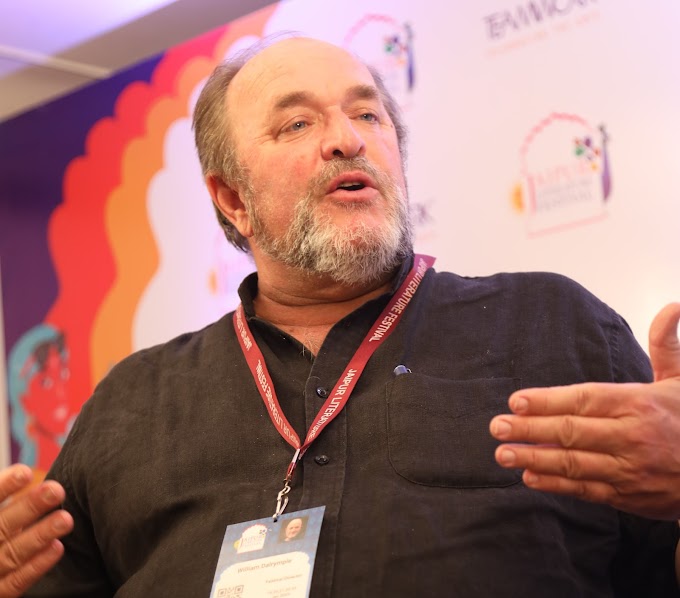Siddhartha Mukherjee will be in the spotlight at the Jaipur Literature Festival 2023. He is a highly respected and accomplished physician, biologist, and author whose work has had a significant impact on the field of medicine and science. His research has led to new treatments for cancer, and his writing has helped to educate and inform the public about the science, history, and implications of cancer and genetics. He continues to make important contributions to the field and to help improve the lives of patients and the public through his work.
Born in New Delhi, India in 1970, Mukherjee began his education in India before moving to the United States to study at Stanford University. He later earned his medical degree from Harvard Medical School and completed his residency at Massachusetts General Hospital.Mukherjee's work as a
physician and researcher has focused on cancer biology, genetics, and
hematology. He is best known for his work on the genetic basis of cancer, and
his research has led to the development of new treatments for various types of
cancer. In addition to his research, Mukherjee has also been a leading voice in
the broader conversation about the ethics and implications of genetic research,
particularly as it relates to cancer.
In addition to his work in
the lab, Mukherjee is also a highly respected author and public speaker. His
2010 book, "The Emperor of All Maladies: A Biography of Cancer," was
a critically acclaimed and bestselling work that delved into the history,
science, and cultural impact of cancer. The book won the Pulitzer Prize for
General Nonfiction and was later adapted into a documentary film by Ken Burns.
In "The Emperor of All
Maladies: A Biography of Cancer," Mukherjee takes
readers on a journey through the history and science of cancer. The book is
both informative and personal, as Mukherjee is not only a doctor and
researcher, but also a cancer survivor.
One of the strengths of the
book is that Mukherjee writes in a way that is easy for the layperson to
understand. He uses clear explanations and metaphors to convey complex ideas,
and he doesn't shy away from discussing the limitations and drawbacks of
current treatments. He also writes about the human side of cancer, including
the emotional toll it takes on patients and their families.
Overall, "The Emperor of
All Maladies" is a comprehensive and engaging look at the history and
science of cancer. It's a must-read for anyone interested in understanding this
disease, and it offers a hopeful message that we can continue to make progress
in the fight against cancer.
Mukherjee's second book,
"The Gene: An Intimate History," was published in 2016. The book
explores the history of genetics and the impact of genetic research on society,
as well as the ethical and moral implications of this research. It too was a
critically acclaimed and bestselling work, and won the Royal Society Insight
Investment Science Book Prize.
“The Gene: An Intimate History” is a masterful and illuminating exploration
of the science and history of genetics. In this sweeping and engaging work,
Mukherjee delves deep into the complexities of genetics, from the earliest
discoveries and theories to the cutting-edge research of today.
The second section of the
book focuses on the science of genetics, delving into the intricacies of DNA
and the genetic code. Mukherjee provides a detailed and nuanced understanding
of the molecular mechanisms of inheritance, and he explains the complex processes
of genetic regulation and expression in a way that is both clear and engaging.
He also explores the ethical and societal implications of genetic research,
delving into the debates surrounding genetic engineering and the use of genetic
information in medicine and other fields.
The final section of the book
focuses on the future of genetics, exploring the cutting-edge research and
technologies that are currently being developed. Mukherjee examines the
potential of genetic editing and manipulation, and he discusses the ethical and
societal implications of these technologies. He also explores the potential for
genetic research to revolutionize medicine and improve human health.
Throughout the book,
Mukherjee's writing is clear, engaging, and accessible. He is able to convey
complex scientific concepts in a way that is easily understood by a general
audience, and he is able to provide a nuanced understanding of the ethical and
societal implications of genetic research. He is also a masterful storyteller,
weaving together the threads of history, science, and personal narrative to
create a compelling and engaging narrative.
The Gene is a must-read for
anyone interested in genetics and the history of science. It is an illuminating
and thought-provoking exploration of one of the most important and
rapidly-evolving fields of science, and it provides a clear and nuanced
understanding of the ethical and societal implications of genetic research. It
is a book that will appeal to scientists, students, and general readers alike,
and it is a testament to the power of science to shape our understanding of the
world and our place in it. It is a book that will appeal to scientists,
students, and general readers alike, and it is a testament to the power of
science to shape our understanding of the world and our place in it. It is a
must-read for anyone interested in genetics and the history of science.
His Latest book, “The Song ofthe Cell” was published last year, in India via Penguin.
In "The Song of the
Cell," Mukherjee, explores the intricacies of the cell and its role in the
development of cancer. Through a combination of scientific research and
personal anecdotes, Mukherjee delves into the history and current state of
cancer research and treatment, highlighting the ongoing struggle to understand
and defeat this complex disease.
Another strength of the book
is Mukherjee's personal anecdotes, which provide a humanizing touch to the
scientific information. He shares his own experiences as a cancer physician and
researcher, including the challenges and successes he has faced in treating
patients and developing new treatments. These anecdotes help to convey the
emotional toll that cancer takes on patients and their families, as well as the
dedication and passion of the scientists working to defeat it.
Mukherjee also explores the
ethical and social implications of cancer research, including the impact of
genetic testing and personalized medicine on patients and society. He raises
important questions about the potential consequences of these developments and
the need for responsible regulation and oversight.
One of the most powerful
sections of the book is Mukherjee's discussion of the ongoing struggle to find
a cure for cancer. He details the many obstacles that researchers face,
including the complex and varied nature of cancer, the limitations of current
treatments, and the challenges of funding and resources. Despite these
challenges, Mukherjee remains optimistic about the future of cancer research
and the potential for new treatments and cures.
He will be in conversation with William Dalrymple on January 20, 2023 from 04:00 PM - 04:50 PM at the Front Lawn. Don't miss the session!







